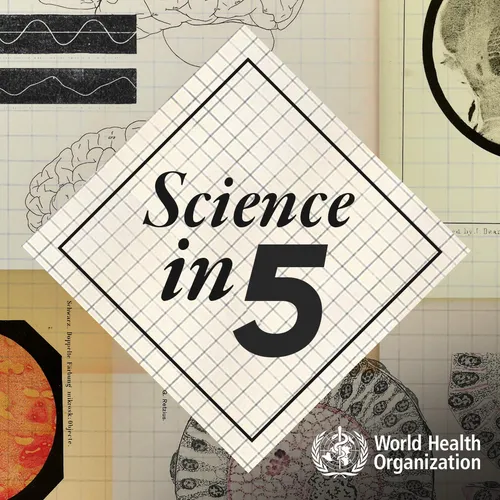
Science in 5
Science in 5 is WHO’s conversations in science. Listen to WHO experts explaining science related to COVID-19.
- Update frequency
- every 13 days
- Average duration
- 5 minutes
- Episodes
- 143
- Years Active
- 2020 - 2025

Asthma and you
Millions of people live with asthma and yet many of them don’t know it. It is one of the most common conditions amongst children. Unfortunately it is also often undiagnosed and under-treated. How wou…

Dementia
Is Dementia a normal part of ageing? Someone suffers from dementia every three seconds. What are the causes? Can we prevent it? Is there a cure? Dr Katrin Seeher explains in Science in 5.

Hypertension
Why is hypertension called a silent killer ? What happens in your body when your blood pressure is high? Learn about the 4 “S”s to protect yourself from hypertension. Dr Taskeen Khan explains today i…

Social Isolation
Did you know that social isolation or loneliness could increase your risk of early death by up to 32%? How would you know if you are socially isolated and how does it impact your health? Alana Office…

UV Radiation
Did you know that putting on your sunglasses is one of the ways to protect your eyes from cataract ? Learn about ways to protect yourself from UV radiation from Dr Cornelia Baldermann, Scientific Sen…

Avian Influenza
Why is WHO concerned about Avian Influenza or Bird Flu? Who is at risk? How can you protect yourself and which foods are safe to eat during an outbreak ? Dr Wenqing Zhang explains in Science in 5.

Low back pain
Did you know that chronic low back pain is a major cause of disability across the world impacting people’s physical capabilities, sleep, participation in work, school and relationships? What kind of…

Is green, healthy transport possible?
In this WHO Science in 5-episode Dr Etienne Krug, Director of Social Determinants of Health, shares examples of cities that are taking action on greener more sustainable transport that can also help …

Dengue Fever
Why is Dengue fever spreading to places it did not exist before? What are the symptoms and treatments? What about vaccines? Dr Raman Velayudhan explains in Science in 5.

Disease X
Disease X
How are scientists working to prevent the next pandemic? What do countries need to do to prepare? Dr Ana Maria Henao-Restrepo outlines the R&D needs that the world needs to invest in to pre…

Obesity – 1 March 2024
WHO's Science in 5 / Episode# 113 -- Did you know that where you live, the food systems around you and your opportunities to be active increase your risk of developing obesity? How big is this issue?…

What is Long COVID?
If you have suffered from COIVID and are still feeling the symptoms, could it be Long COVID? What are the symptoms? Are treatments available? WHO’s Dr Jamie Rylance explains in science in 5.

Sun and skin cancer
WHO and the International Labor Organization (ILO) recently released estimates on how many workers are exposed to intense sunlight at work and how many of them develop non melanoma skin cancer. How d…

Protecting you from substandard and falsified medicines
You may have heard about substandard or falsified syrup harming children and even causing deaths. There have been reports of falsified diabetes and weight loss treatments. How can you protect yoursel…

Adult eye care
Did you know that 70% of the people who need eye glasses do not have access to them? What are the leading causes of blindness? Who is at risk and how can you prevent it? Dr Stuart Keel explains in Sc…

How can you protect your child’s vision?
Did you know that more and more children are having trouble seeing things that are at a distance? What are the early signs? How would you know if your child is at risk and what can you do to protect …

How is climate change affecting your health?
Climate change is affecting your health every day. What are the future scenarios for health? How can you cope and protect your health? Dr Diarmid Campbell-Lendrum explains in Science in 5.

Why should you care about Data?
Why should you care about data? what can data do for you? How does WHO work with data? Dr Samira Asma explains how data works to protect your health in Science in 5.

Growing up informed: Sexuality Education
Are you a parent, teacher or just someone who cares about sexuality education? Dr. Chandra-Mauli Venkataraman answers the important questions on sexuality education in the latest episode of Science i…

Smoke-free indoor spaces
Indoor smoke-free spaces are becoming more commonplace, and for good reason. Did you know that over a million people die every year due to second-hand smoke? One in three countries now have policies …